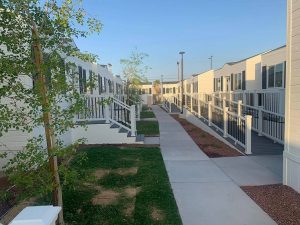 By: Veronica Henderson, Attorney.
By: Veronica Henderson, Attorney.
For most children, turning 18 is a rite of passage that is exciting and liberating. However, for children who have been taken from their parents due to abuse and neglect, leaving the care and custody of the social services department can be frightening and cause fears of possible homelessness, poverty, and loneliness.
Up until age 18, the child welfare department must provide all the basic necessities of life, and also must offer medical, educational, and other forms of support to the children it serves. In essence, the social services department becomes the “parent” for the minor. Historically, once a foster child turned 18, the age of emancipation, he or she was expected to leave the system and seek other forms of support or try to gain independence on his or her own.
Fortunately, there is now a choice that a young adult can make, which allows him or her to remain involved with the child welfare system, albeit in new, supportive ways. Now, minors becoming young adults can choose to stay in what is commonly referred to as “extended foster care” or an “independent living program.”
With the passage of Assembly Bill 12, signed into law September 30, 2010, and effective as of January 1, 2012, making improvements to outcomes for youth in foster care (that was now coming to an end) became a reality. This legislation allowed these young adults to receive support and benefits up until age 21. When the Covid-19 pandemic hit, youth turning 21 while the pandemic was going on could even extend their AB 12 program several months longer. The program also allows youth to opt-out of the program or leave it early, and then re-enter the program if they choose to do so before they reach the age of 21.
Because our young adults must commit themselves to a responsible, successful future, there are several requirements, in addition to those relating to age. The young man or young woman must be working toward the completion of high school or enrolled in college or a vocational program must be employed or participating in a program to assist in gaining employment or must have a medical condition that precludes him or her from meeting these requirements.
 The goals of the Extended Foster Care system include (1) enabling young adults to maintain a “safety net” of support while experiencing independence in a supervised living environment; (2) providing youth extended time in care to address the effects of trauma, obtain education and employment training opportunities, while developing permanent connections to supportive adults, and (3) participating in the Independent Living Program (ILP) which helps youth gain the knowledge and skills needed for self-sufficiency and successful transition into adulthood.
The goals of the Extended Foster Care system include (1) enabling young adults to maintain a “safety net” of support while experiencing independence in a supervised living environment; (2) providing youth extended time in care to address the effects of trauma, obtain education and employment training opportunities, while developing permanent connections to supportive adults, and (3) participating in the Independent Living Program (ILP) which helps youth gain the knowledge and skills needed for self-sufficiency and successful transition into adulthood.
In practice, being involved in this extension of the child welfare system gives our young people a place to live, the skills to thrive in society, and a renewed sense of purpose.
Our communities can offer further services to assist our younger adults, be it through job training programs or new and innovative solutions to housing. For example, Imperial Valley College has recently built a tiny home village for students, with priority given to those who were formerly in foster care. These 26 small houses are fully furnished and provide a community of support for your college students.
The young adults that avail themselves of extended foster care and other community programs are ready to take on the world, with all of the excitement and challenges that this entails.


